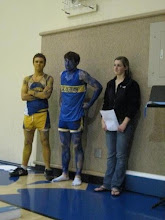T
he Grindstone by Robert FrostHaving a wheel and four legs of its own
Has never availed the cumbersome grindstone
To get it anywhere that I can see.
These hands have helped it go, a
nd even race;Not all the motion,
though, they ever lent,
Not all tke miles it may have thought it went,
Have got it one step from the starting place.
It stands beside the same old apple tree.
The shadow of the apple tree is thin
Upon it now its feet as fast in snow.
All other farm machinery's gone in,
And some of it on no more legs and wheel
Than the grindstone can boast to stand or go.
(I'm thinking chiefly of the wheelbarrow.)
For months it hasn't known the taste of steel
Washed down with rusty water in a tin..
But standing outdoors hungry, in the cold,
Except in towns at night is not a sin.
And> anyway, it's standing in the yard
Under a ruinous live apple tree
Has nothing any more to do with me,
Except that I remember how of old
One summer day, all day I drove it hard,
And someone mounted on it rode it hard
And he and I between us ground a blade
.I gave it the preliminary spin
And poured on water (tears it might have been);
And when it almost gaily jumped and flowed,
A Father-Time-like man got on and rode,
Armed with a scythe and spectacles that glowed.
He turned on will-power to increase the load
And slow me down -- and I abruptly slowed,
Like coming to a sudden railroad station.
I changed from hand to hand in desperation.
I wondered what machine of ages gone
This represented an improvement on.
'For all I knew it may have sharpened spears
And arrowheads itself. Much use.for years
Had gradually worn it an oblate
Spheroid that kicked and struggled in its gait,
Appearing to return me hate for hate;
(But I forgive it now as easily
As any other boyhood enemy
Whose pride has failed to get him anywhere).
I wondered who it was the man thought ground-
The one who held the wheel back or the one
Who gave his life to keep it going round?·
I wondered if he really thought it fair
For him to have the say when we were done.
Such were the bitter thoughts to which I turned.
Not for myself was I so much concernedOh no --
Although, of course, I could have found
A better way to pass the afternoon
Than grinding discord out of a grindstone,
And beating insects at their gritty tune.
Nor was I for the man so much concerned.
Once when the grindstone almost jumped its bearing
It looked as if he might be badly thrown
And wounded on his blade.
So far from caring,I laughed inside,
and only cranked the faster
(It ran as if it wasn't greased but glued);
I'd welcome any moderate disaster
That might be calculated to postpone
What evidently nothing could conclude.
The thing that made me more and more afraid
Was that we'd ground it sharp and hadn't known,
And now were only wasting precious blade.
And when he raised it dripping once and tried
The creepy edge of it with wary touch
And viewed it over his glasses funny-eyed,
Only disinterestedly to decide
It needed a turn more, I could have cried
Wasn't there a danger of a turn too much?
Mightn't we make it worse instead of better?
I was for leaving something to the whettot.
What if it wasn't all it should be?
I'dBe satisfied if he'd be satisfied.
